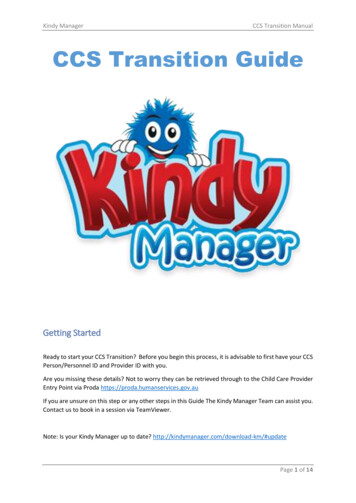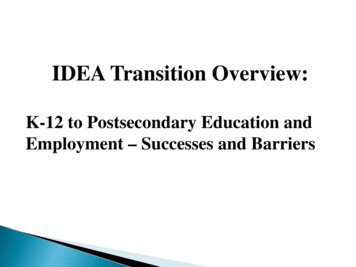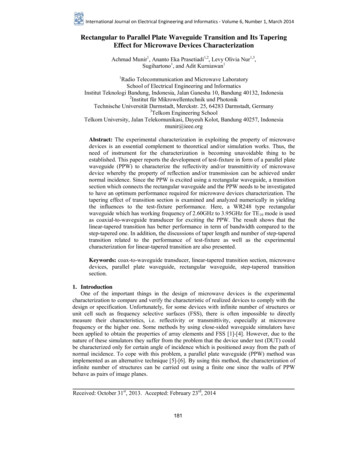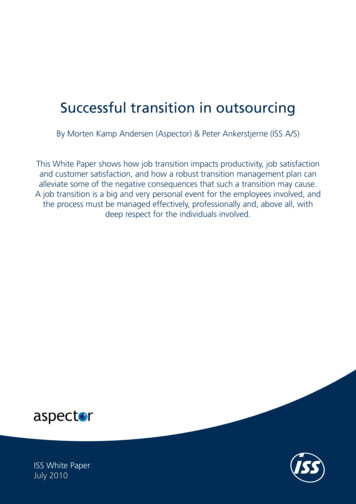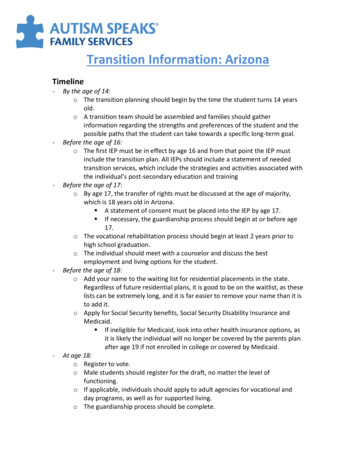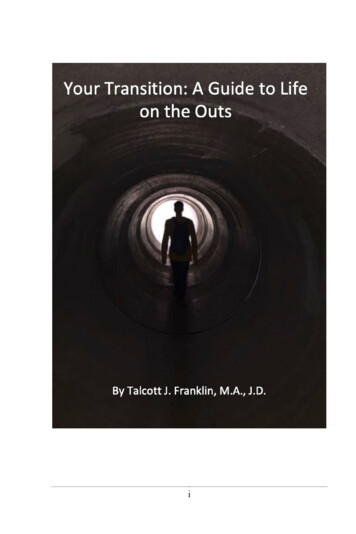
Transcription
i
Your Transition: A Guide to Life on the OutsTalcott J. Franklin, M.A., J.D.Penobscot Publishing Co. 2020 Talcott J. FranklinAll rights reserved. No part of this work may be reproduced withoutthe written consent of the author, except for distribution within thecorrectional and probation system if reproduced in its entirety andwithout additional content. No claim to original government work.ii
Table of ContentsAbout the Author . 1Chapter 1: Getting Out. 3Make a Plan. 3Understand Your Challenges . 4Understand Your Advantages . 5Parole . 4Apologizing. 9Advice from Successful Transitions . 11Making Sense of Suffering . 16Chapter 2: Your Biggest Risk and Best Protection . 21Friends . 21Friends and Relations Exercise . 22Instincts . 23Trusting Your Instincts Exercise . 25Reading . 26Reading Exercise . 27Chapter 3: Emotional Intelligence . 28Humility . 28Humility Exercise . 29Empathy . 29Empathy Exercise. 31Accountability . 31Responsibility Exercise . 32Rage . 33Anger Exercise . 37Chapter 4: The System. 39Does Crime Pay? . 39Police . 40Parole Officers . 42Education . 42The Government . 46iii
Charities . 47What I Need Exercise . 47Banks & Finance. 48Social Security. 52Chapter 5: Drugs & Alcohol . 54Drugs . 54“Date Rape” Drugs . 57Alcohol . 58Rough Alcohol Equivalencies. 60Drinking and Drinking . 62An Old Story . 63Chapter 6: Dating & Relationships . 65Existing Relationships . 65How to Talk to Women. 66Dating . 70Abusive Relationships . 71Breakups and Pain . 72Cheating . 75Random Hookups . 77Prostitutes . 80The Internet . 81Sexual Assault and Coercion . 82Pregnancy and STIs. 83Why do People Commit Sexual Assault? . 85How do You Avoid Appearing or Being Coercive . 87Affirmative Consent. 89What if You are Sexually Assaulted? . 91Victim Blaming . 91Chapter 7: Mental Health . 93Mental Illness . 95Seek Counselling . 98Chapter 8: Technology . 99Texting . 99iv
Online Privacy . 100Technology Scams . 102Technological Distraction . 102Social Comparison . 102Chapter 9: Job Tips . 104Job Planning . 104Resume Writing . 104Resume Building Exercise . 106Interview Tips. 109Before the Interview. 109During the Interview . 111After the Interview . 116Sample Questions . 117Parting Words . 121Happiness . 121Personal Success . 122v
Chapter 1: Getting OutEvery day when you wake up, ask yourself one question:What can I do today to reduce my time in prison and makea successful transition upon my release? Whenever you feelfrustrated or upset, ask yourself a second question: Is myreaction to this situation going to get me out of here sooneror keep me in here longer?You are probably looking forward to getting out of prisonwith excitement about regaining your freedom mixed withworry about reestablishing (re-starting) old relationships,getting a job, and finding a place to live.This book is meant to help you understand how to reduceyour prison time, what to expect upon getting out, how tokeep yourself safe from the many dangers facing someonestarting a new life, and how to be successful after you havepaid your debt to society.Do not wait until you get out to read this book! You shouldstart preparing now for the next chapter in your life. Thisbook will give you some tips on how to get started.Make a PlanMike Tyson said, “Everyone has a plan until they getpunched in the face.” And in trying to establish your life onthe outs, you are going to get punched in the face, whetheryou have a plan or not. But the question is whether you areone of those people who get punched in the face and says, “Igive up.” If so, be prepared to get knocked out. BusterDouglas got punched in the face, but he stuck to his plan.1
And he knocked out Mike Tyson in one of the greatestupsets in boxing history. An old saying goes, “Those who failto plan, plan to fail.” It is time to make a plan. The plan startsbroad: “Get a job” and then gets more specific based on yourresearch: “Contact Catholic Charities about workopportunities” or “Send letters to the 100 companies in myarea that say they provide job opportunities for parolees.”Always be willing to adjust the plan. Ronald Reagan began hisautobiography (book about his life) by saying, “If I’d gottenthe job I wanted at Montgomery Ward, I suppose I neverwould have left Illinois.” If one door closes, find four morethat you can open. Reagan turned his failure in Illinois intocareers as an actor, spokesman, governor of California, andPresident of the United States.Understand Your ChallengesIt is not easy to change. It is not easy to find work or housingafter getting out of prison. It is not easy to re-connect withchildren or parents or spouses or old flames. It is not easy toearn people’s trust. It is not easy to beat an addiction. It is noteasy to tell people you used to run with that you can’t do thatanymore. It is not easy to re-direct your anger. Many otherthings you will face also are not easy.Life is hard enough without having to also overcome acriminal record. But here we are. You have a choice: you canlay down like a hammer hit you or you can rise to theoccasion. You can accept the label many in society want toput on you or you can prove them wrong.2
A boy started at a new school after his parents’ divorce. Hehad a large scar on his head from a bad auto accident. Theother students called him “Frankenstein” and told him hewas stupid because his brains leaked out after the accident.And do you know what? He believed them. He was heldback twice, put in special education, and could not do hismultiplication tables.Then he moved in with his father in a different city. His fathertaught him the multiplication tables over the summer so heknew them cold. His father told him he was smart, and heproved it in his new school by giving the answers to themultiplication questions. Then the other students told himhe was smart. And do you know what? He believed them.He went on the honor roll that year and remained there everyyear until graduation.Never let the person you were yesterday determine who youare today. This works both ways. A basketball player madeevery shot during practice yesterday. Does that player stoppracticing today because of yesterday’s great performance?Of course not! That player has to bring it every day or getcut from the team.Likewise, if someone made a mistake yesterday, does thatdoom them to make the same mistake the next day? Ofcourse not! Everyone makes mistakes. No one is perfect.Every single person who has ever lived is an imperfect vehiclefor the good they can do.Saint Francis of Assisi is one of the most honored figures inall Christianity. But before he came to God, he lived a sinfullife. As Francis said, “God could not have chosen anyone3
less qualified, or more of a sinner, than myself. And so, forthis wonderful work He intends to perform through us, Heselected me; for God always chooses the weak and theabsurd, and those who count for nothing.”John Newton was the captain of a slave ship, one of themeanest things anyone could do to other people. He couldhave decided that he was beyond redemption (saving) andwallowed in his past.But instead, John became a pastor and worked to abolish(end) the slave trade. He also wrote one of the most beautifulsongs in history: Amazing Grace. The lyrics of that songspeak to us from someone who caused great harm to manypeople and wants to make up for his wrongs: Amazing Grace/ How sweet the sound / That saved a wretch like me / I oncewas lost but now I’m found / Was blind but now I see.John said that “When people are right with God, they are aptto be hard on themselves and easy on other people. Butwhen they are not right with God, they are easy on themselvesand hard on others.”You don’t have to believe the labels some in society will placeon you. You’re not stupid. You’re not hopeless. You’re notevil. You’re not incapable of redemption. Don’t give negativepeople control over who you are and what you will become.Understand Your AdvantagesYou do have some things going for you. When I worked inmaximum security, my boss used to say, “Never drop the big4
hammer on someone. Do you know why? Because they learnone thing: I survived.”Well, you had the big hammer dropped on you, and yousurvived. The things ordinary people fear, the doubts thathold them back in their education and careers, should carryno weight with you: What if I fail? What if they make fun of me? What if I’m rejected?Surely you have the courage to try and improve yourselfthrough education, try for the promotion, or follow yourdream of painting or music or writing.In addition, Americans love a comeback. The person whosucceeds after hitting rock bottom is applauded andappreciated. And, by the way, if you don’t think prison is rockbottom, save yourself some time and stop reading at the endof this sentence: if you ever get out, you’re going back.It is true that some people will never give you another chanceor forgive what you did, but those people are in the minority.Most Americans are pretty forgiving of someone who showshumility, accepts responsibility, and changes for the better.Former NFL quarterback Ryan Leaf was such a notorious(well known) jerk that when his name was announced at aboxing match, the crowd booed him! The joke atWashington State University where he played college footballwas “What’s the difference between Ryan Leaf and God?God doesn’t think he’s Ryan Leaf.”5
But since his release from prison, Ryan has shown the utmosthumility. In prison, he discovered that by helping others hecould help himself. He got sober. He issued a heartfelt andsincere apology and took full responsibility for his actions.He took a minimum wage job driving people to a rehabclinic. He spends a great deal of time telling his story to oftenvery small groups of people who want or need to hear it.When he wanted to use his college degree to get intobroadcasting, he went to others and asked them to teach himhow it was done.And guess what? Despite all the horrible things Ryan Leafdid and the terrible way he mistreated others, people are nowrooting for him. If you also take those kinds of steps, peoplewill root for you, too.Some people have labeled Ryan a “bust” because he didn’thave a great NFL career. But Ryan being a great quarterbackdoes absolutely nothing to better the world. By sharing hisstory and spending time with many people who have fallenand need his help, Ryan has done more to better the worldand ease human suffering than if he’d won every footballgame for ten years in a row.When the Persian Great King Cyrus was asked why thePersians had their capital in a far away and mountainousplace, rather than in one of the many beautiful cities thePersians had conquered, he responded, “Rough Countrybreeds tough people. Soft Country breeds soft people.” ThePersian toughness showed itself in a relentlessness (theynever gave up) that saw setbacks and challenges as mereproblems to overcome.6
Like the Persians, you have lived in Rough Country. Like thePersians, you can turn that toughness into a relentlessness ofpurpose, and then there will be little you cannot eventuallyovercome.The other advantage you may have is time. From this dayforward, spend the remainder of your time in prison planningfor your release. Some things you can and should do inprison: Attend counseling sessions and group meetings toovercome damaging behaviors and addictions Read books about jobs you are interested in, history,psychology, or skills you would like to develop Hone your artistic skills, such as writing, art, music, ormath Study for the GED, college courses, or othereducational opportunities Participate in prison work programs to get real jobexperience Be a model prisoner in terms of following rules andavoiding disciplinary issues Develop a relationship with a church or otherorganization that might help you when you arereleased Issue a sincere and honest apology to anyonevictimized by your crime Volunteer for prison programs where you lead othersor work as a team, like teaching other inmates to read7
Each of these steps will help you transition back into societyand maybe even give you a leg up on someone who wasn’tincarcerated. These steps will also put you in touch withpeople – like a counselor – who can write a letter ofrecommendation for you upon your release.You have a choice here. You can choose to be warehousedor you can use this time to learn and grow.Parole/ProbationIn Maine, the way to reduce your time spent in prison is toearn your way into minimum security and then apply forsupervised community confinement.In determining whether or not to allow you to do this, theState looks at your criminal history, employment history, age,and the severity of the offense. These are things you cannotchange at this point. But the State also looks at your prisondisciplinary conduct, whether you have participated in joband character development programs, whether you have aplace to live that will be a positive influence on your behavior,and whether you have a release plan that is likely to succeed.You control all of these factors!You should start thinking about release today.You should also start planning for your supervisedcommunity confinement application immediately. Thismeans: Gathering letters of reference and support frompeople inside and outside the prison8
Mending fences with any prison staff you’ve offended Creating a plan for your successful release Doing the things listed in your plan that you can dowhile in prison Writing a sincere and heartfelt apology to yourvictim(s)Each and every day, task yourself with doing something thatwill better prepare you for your release. Your opportunity forearly release will be here before you know it, and if you followthis advice, you will be able to show the State that you havetaken your rehabilitation seriously and are likely to succeedif released.ApologizingAir Force Tech. Sgt. Gary Sapone observed that “As simpleas it may sound nothing seems more powerful and able toaccomplish more than a simple heartfelt apology.” In fact,Sapone adds that research has shown that receiving anapology has noticeable positive effects on the body.A smart thing to do while serving time is write an apology tothe people you harmed as a result of your crime andincarceration. When apologizing, keep in mind the advice ofBenjamin Franklin, who many think was the smartest of ourFounding Fathers: “Never ruin an apology with an excuse.”For a good apology: Say you are sorry Take responsibility for your actions9
Let them know they are not to blame for whathappened Let them know you know you hurt them Tell them anything you have done to make sure younever do anything like that to anyone else again Admit you were wrongA bad apology: Blames the victim (e.g., “When you called me thatname, I lost control and hit you”) Blames the circumstances (e.g., “If I hadn’t beendrunk, I never would have hit you”) Minimizes the consequences (e.g., “Fortunately, Ididn’t hit you as hard as I could have”) Whines or complains (e.g., “I am in prison andsuffering for what I did to you”) Asks for help (e.g., “Please write the State asking formy release”)Most importantly, your apology must be sincere and comefrom the heart. If you take satisfaction in the fact that you hurtyour victim, think the victim got what s/he deserved from you,or blame the victim for what happened, do not try andapologize, as your attitude will come through in the apologyand the State will understand from your apology that you areonly sorry you got caught and that you have no remorse forhurting your victim.Advice from Successful Transitions10
Many people have successfully transitioned back into societyafter serving time. Some of them were kind enough to sharewhat they wish they knew before leaving prison and what theylearned along the way. Obviously, their advice varies basedon their experiences, and you may have differentexperiences. Here are their viewpoints summarized.What to do before getting out: Write down plans and goals, get organized, completea resume, get addresses and phone numbers of placesyou need to go to get your driver’s license, healthcare,and anything else you think you will need. Get a head start on the proper identity papers,particularly the birth certificate and Social Securitycard. Go to your chaplaincy department while still in prisonand try to find a group or organization that will be therefor you from the moment you are released. Apply for educational grants and better yourselfthrough education.Parole/Probation: Be respectful of those that are there to help you,including your parole or probation officer. Ask for help in working on your plan and in findingresources that are out there to help you succeed.Employment: It will be difficult to find work and a place to live.11
Learn a trade or work skill while in prison. Do a web search for “Jobs for people with felonies”and you will find a long list of companies who hire exfelons. Expect to be turned down at job interviews because ofyour felony. Take whatever job you can get and do it well until youfind the job you want. Expect to have to earn people’s belief in you, but onceyou do it will be well worth your perseverance.Change: The world you left no longer exists. Things are not thesame as before you went in, especially with technology. There are simple everyday tasks that you will not knowhow to do. Don’t be afraid to ask for help. It’s easy to get overwhelmed with even simple tasks, sostay focused and determined. Life for someone in prison doesn’t change day to day.But the world outside the prison walls changes daily. Don’t try to pick up where life was when you wereincarcerated. Understand that things have changed. You’re going to get rejected and some things are notgoing to pan out the way you envisioned but staypositive and do not give up. Expect to face change and adversity. There are a lot of obstacles with employment, housing,and transportation. Things are not as easy as you think.12
It is easy to just say “I’m going to get a job, buy a home,start a family,” but it takes hard work to obtain thesethings. They don’t just suddenly happen. It’s frustrating when you try so very hard and see solittle progress. You need faith and confidence. Bedoggedly persistent. You’ll have a huge hole in your life where kids and acareer should be. Be flexible and open minded to change. Things willmost likely not be as you envisioned them to be.How to Behave: Show humility and be teachable! Don’t allow pride tostand in your way. Don’t be scared to ask for help. Wear age-appropriate clothes. Date age-appropriate people. If you are not ready to give up all your criminalbehavior and ways of thinking you might as well stay inprison. Everything you say or do will be verified. You mustdecide that you will be honest. There will be bad days, but remember you’ve alreadymade it through the darkest part. Live your life not to disappoint those who are cheeringyou on and helping you. Network. Be honest, friendly, careful, helpful, and have cleanhabits. Try and create stability.13
Express sincere gratitude, which means not just withwords, and pay forward any help you receive.Being Judged: You may get judged by some people, but again, staypositive and don’t give up! In the eyes of many, you are nothing more than acriminal. Society will be quick to take the ex-felon labeland run with it. Expect to feel “different” than everyone around you. Despite smiling to your face, people will be wary andsuspicious of you, but about half believe in secondchances. Avoid the other half. Society assumes because you were once a criminal,you will always be a criminal. Some will be cruel, butyou will find others who will be compassionate. Thesecompassionate ones will be your best source forsupport and stability.Family and Friends: Ask family for support. Family, friends, and loved ones can be some of yourbiggest downfalls if they want you to go back to the wayyou were before prison. One of the best things can be support from family andfriends if they want you to change for the better! Move out of the environment you came from. Stay away from friends and family who use drugs andalcohol.14
Stay away from those people you associated with priorto being incarcerated. Once the initial excitement about your release is over,everyone will be going back to their lives. Those people who believe in you are going to be there. Expect to have to earn people’s belief in you, but onceyou do, it will be well worth your perseverance. Get feedback from family on how you are doing.Resources: Use the resources given to you by the Department ofCorrections. No one coming out wants to work with theDepartment of Corrections, but the resources that theDepartment of Corrections provides are beneficial. You can secure employment and obtain a place ofyour own with the help of Department of Correctionsprograms. When you are released, the small amount of cashgiven to you will not sustain you for more than a coupleof days. Surround yourself with a church community. Find an active church group that helps ex-offenders. Seek out family first and then a church for help. Catholics are particularly good at helping ex-offenders. Find someone who will hold you accountable. If you are not fortunate enough to have family support,approach a church or social organization forimmediate assistance.15
Keep in mind that the first two weeks after getting out areoften the hardest of all, and things will get better as you adjustto life on the outs.Making Sense of SufferingPrison is not easy. You undoubtably suffered in many ways.Life on the outs also has hardships. How do we make senseof it?In the 1930s in Austria, a doctor name Viktor Frankl cameto believe from his studies that people needed meaning andpurpose in their lives, even in the darkest of times. Hebelieved that we can find meaning in life, even in the mostmiserable circumstances where nothing seems to makesense. In fact, he thought our main motivation (reason) forliving was to find meaning in all we do, and that people havethe freedom to find meaning in even the worst conditions.People create meaning by doing a good deed, experiencingor meeting someone new, or taking a positive attitude evenunder the worst circumstances. Of course, this all soundsgreat in theory, but what would a privileged medical doctorknow about suffering?Well in 1938, Nazi Germany invaded Austria. And in1942, Frankl, his pregnant wife, and his parents were sent toa concentration camp for the “crime” of being of Jewish. TheNazis took Frankl’s home and possessions, confiscated thebook he was writing, forced his wife to have an abortion, andeventually separated him from his family.16
In the concentration camp, they were scarcely fed, giveninadequate clothing or shoes, killed both by design and atrandom, forced into slave labor, and subjected to beatingsand humiliation. Col. William Quinn and Gen. DwightEisenhower each described such camps in separate reports:In the midst of the senseless suffering that would later sickeneven hardened military men who oversaw years of savagefighting, Frankl put his theory to work. He focused onhelping other detainees. He realized in these dark17
circumstances, he needed to give people meaning by helpingthem focus on some future goal.He also “allowed” himself to be free in certain moments,feeling what little good was available to him, like the sun onhis face or a pleasant memory with his wife. He re-composedhis book in his mind. The Nazis could not take that fromhim. He believed he could learn from every experience, goodor bad, and he sought to do so in the concentration camp.Frankl said, “Everything can be taken from a person but onething: the last of the human freedoms – to choose one’sattitude in any given set of circumstances, to choose one’sown way.” Frankl believed there were only two types ofpeople, “good people” and “bad people”, and no matter whowe are and what we’ve been, we have the freedom to choosewhich we want to be going forward.Frankl also believed that if we fail to seek meaning, we fill ourlives with meaningless pursuits, such as drugs, money, food,anger, or dominating others. When we seek these things, wemove further from finding the meaning we so desperately
Mike Tyson said, "Everyone has a plan until they get punched in the face." And in trying to establish your life on the outs, you are going to get punched in the face, whether . autobiography (book about his life) by saying, "If I'd gotten the job I wanted at Montgomery Ward, I suppose I never would have left Illinois." If one door .

